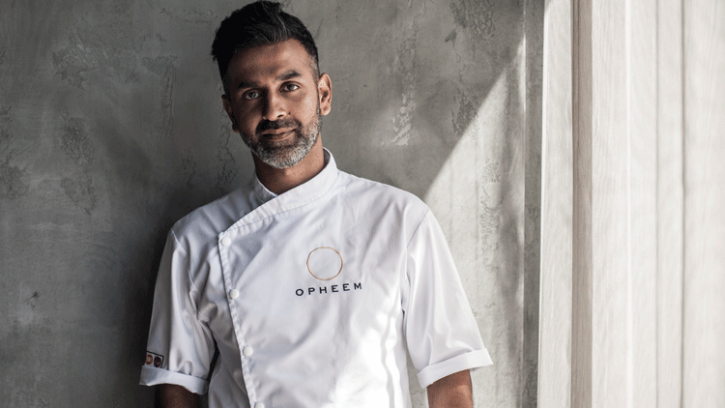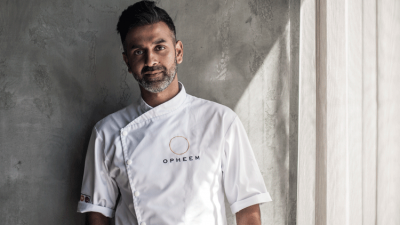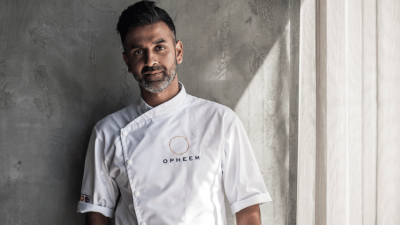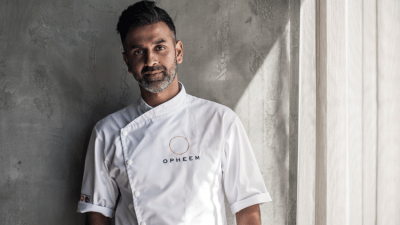Aktar Islam: “I'm worried my younger cooks have entered an industry that has no future”

Congratulations on five years of Opheem
It’s bittersweet. Between January and March, I only made £320. I'm paying myself a salary as well, of course, but that's for my labour. As things stand, I'm wondering what the point is if I can’t generate a profit. I’m not alone. A lot of my peers are in an even worse situation despite running some of the country’s most highly-rated restaurants. At least I'm breaking even - a lot of people aren't. I recently had a conversation with a high-profile chef that is a couple of weeks away from folding.
Is the restaurant busy?
Lunches have always been tough in Birmingham, but Opheem is busy in the evenings – the dining room is usually full. Rising costs have made it nearly impossible to turn a profit. Food and energy costs have increased dramatically but our biggest problem is the skills shortage that has been caused by the pandemic and Brexit. We’re having to hire two people to do one person’s job and pay them over the odds. We just don't have the skills; in many cases they are training on the job so they are nowhere near as efficient as someone that is fully trained. What is classed as a CDP now was a best a commis just a few years ago. I have chefs on £28,000 that can barely peel an onion.
How many services do you do a week?
Six. Four evening and two lunches. If we increased our opening hours, we would dilute the number of covers we get per service and increase our labour costs. Opheem is good value compared to other Michelin star restaurants - we do 10 courses for £125 (a shorter version is available for £95) and we also do a three-course lunch menu for £65 (£50 for two courses). We’re busy. There’s no issue with our turnover, the problem is our margin.
Do you think you’ll ever get your initial investment in Opheem back?
As things stand it’s difficult to see us getting the £2.5m we put in back. We've barely recouped any of that investment so far, in fact. We were only trading for a year or two when Covid hit. Thankfully we didn't take on debt during the pandemic, so we are in a better position than most. We paid the rent at Opheem through cash injections from myself and my partners.
Are there any levers you can you pull to increase profitability?
Not really. If we raise prices, we will price ourselves out the market. Dropping prices to increase the amount of covers we do won’t help either as it will push up our labour costs and devalue our product. Some restaurants at Opheem's level have cut their prices or offered discounts but in my view that is the wrong thing to do. With every cover you're digging yourself an even deeper hole. It’s very difficult for restaurants operating at this level to cut costs. The model is broken. The system has always been stacked against restaurants of this level. Our margins are low and our costs are high. We need a fairer playing field.
What do you mean by that?
We need the Government to create a fairer VAT system. On the face of it, it might look like restaurants are doing well in terms of the amount of money they turn over, but they aren’t making any money themselves they’re just fuelling the economy. We generate a lot of VAT but there is very little that we can claim back, unlike many other industries. There's a real burden on hospitality. I feel like I'm working for the Government - at the end of the month there's nothing for me.
A cut to VAT is extremely unlikely…
The Government needs to understand that hospitality is at breaking point. I think we may already be there, actually. Politicians have a view that if an SME fails another one will take its place but that won’t be the case for restaurants soon. It’s simply not an attractive industry to be in. But I will find ways to keep my business alive. I did it throughout the pandemic with Aktar at Home (which is still going). And I will do everything I can to make sure that every member of my team has a viable future with me and within my company. But I don't think everyone is able to do that. I'm worried my younger cooks have entered an industry that has no future.






















